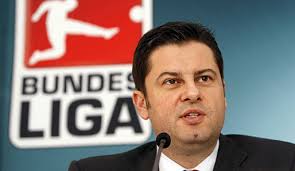By Andrew Warshaw
October 9 – The Premier League may be the most watched in world football worth a staggering £5.5 billion over three years, including overseas rights of £2.4 billion, but money doesn’t necessarily buy you world-class stars.
That was the stark message delivered today by Bundesliga CEO Christian Seifert when addressing the Leaders in Sport Business summit on the state of the game in Germany.
Germany has the biggest average attendance in European top-flight football, partly because of affordable ticket prices, and were of course crowned world champions in Brazil, largely off a foundation of a highly effective youth programme.
All this, Seifert suggested, represented a proud blueprint for success, a model the Premier League might do well to consider emulating given the English national team’s lack of world-class talent.
“Sometimes you can have too much money,” said Seifert who suggested the salaries on offer to induce the cream of foreign players to England was squeezing out local talent.
“Would we have so many World Cup winners playing in the Bundesliga if we had TV contracts like in England? We cannot copy this landscape but if you have so much money compared to us …and can afford virtually any player around the world, how motivated are you to put your cards on young players?”
“In 2022 we had around 1.8 million registered young players but only two world-class national stars in Oliver Kahn and Michael Ballack,” added Seifert. “It was the most successful period for German club football but there was something wrong at national level.”
Cue an immediate investment in youth with everyone pulling together.
“In 2014 we still have around 1.8 million, or a bit more, but in the youth academies 5,000 players are being trained starting with the under-12s,” said Seifert. ” Now we have more than 20 world-class players.”
Seifert also reacted to reports that the Premier League had informally discussed resurrecting the idea of playing competitive matches overseas.
Again, said Seifert, this was simply not the German way.
“We have a completely different approach to our concept for German football. It would be against our understanding of how the fans should be involved,” he said.
“Maybe for financial reasons it would appear to be a good idea but think of the supporters who go to 34 games in all conditions, no matter the wind or the rain. Then their club comes to a game which decides whether it will be relegated or not – and they cannot be there because it’s in Thailand. That would not be an approach for the Bundesliga.”
Seifert may have conveniently forgotten that Germany’s major clubs, unlike in England, have not had to recoup huge amounts spent on building stadiums, courtesy of having staged the 2006 World Cup.
Nevertheless, he had a lot to crow about, not least the rule that no single investor can own more than 49% of a German club until he has been there for 20 years. That, said Seifert, stops foreign owners buying up clubs at the drop of a hat and ripping up years of commercial planning.
“If you don’t have a regulated market, you can be taken over overnight by people from Germany, China, Russia, India, anywhere. And all your expectations over how to earn revenue for the next 10 years are thrown away.”
Contact the writer of this story at moc.l1734849563labto1734849563ofdlr1734849563owedi1734849563sni@w1734849563ahsra1734849563w.wer1734849563dna1734849563

